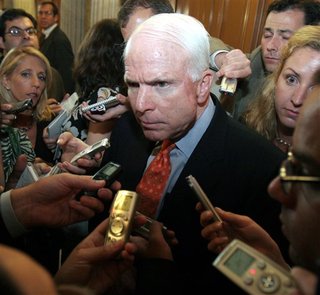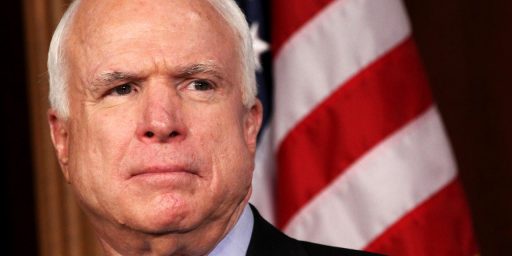John McCain’s Gentleman’s Agreement with the Press
 Steve Benen argues that the press gives John McCain a pass on gaffes they would crucify other politicians for. He cites this report by Jason Zengerle as largely explaining why:
Steve Benen argues that the press gives John McCain a pass on gaffes they would crucify other politicians for. He cites this report by Jason Zengerle as largely explaining why:
The simple explanation is: McCain affords the press access like no other candidate. In the McCain campaign, there’s no barrier between candidate and reporter. If you have a question for McCain, you don’t have to bother going to his press secretary; you simply go ask him. On some days, you literally spend eight hours with the candidate, just riding with him in the back of his bus peppering him with questions on everything from Pakistan to his philosophical thoughts about suicide. Toward the end of the day, this amount of unfettered access to the candidate can actually be a bit of a problem, when you start to run out of questions for him and there are awkward silences. But, on the whole, it’s hard to overstate the sort of goodwill this access engenders among reporters.
Benen cites an article he wrote last April on this subject, reporting on an incident wherein many reporters decided not to report on an anti-Vietnamese slur:
According to one insider I talked to, there was a “gentleman’s agreement” in place — in exchange for access and freewheeling interviews, most campaign correspondents would knowingly look the other way from some of McCain’s more “candid” blunders.
Benen thinks this problematic but it strikes me as exactly the way it should be.
It’s a return to a bygone culture, wherein politicians let their guard down in front of reporters, who in turn operated under a professional code to not report on small gaffes or embarrassing incidents that had no impact on public policy.
John Kennedy had that relationship with the press. So did Franklin Roosevelt. To be sure, it was sometimes taken to ridiculous extremes, as when the press played along with FDR’s charades to conceal that he was confined to a wheelchair. That was something the public had a right to know.
Some calls are tougher: She the journalists around Kennedy have reported on his extramarital affairs? Or were we better off knowing, as was the case during the Clinton administration?
In the interests of full disclosure, McCain has done much the same with bloggers as he has traditional media. He holds conference calls three or four times a month and allows no-holds-barred questioning to which he offers candid answers and the opportunity for follow-ups. He’s invited bloggers to ride on his campaign bus, an offer which some have accepted. (I declined, almost entirely because of time allocation priorities.) No other top tier candidate has done anything like this and it’s won him quite a bit of good will.
Why shouldn’t this be the case, though?
The press and the public alike claim they want to get beyond canned answers and talk of the horse race and instead get into the meat of the policy debate. McCain has been doing that for years. His candor and cantankerousness have no doubt harmed him but people nonetheless find it refreshing.
And, hey, if other candidates want to whine about the advantage McCain gets from giving unfettered access to reporters, maybe they should try it themselves.
Photo Credit: AP News Blog





I dunno about this. I asked a friend who’s loosely connected to some national Republican figures why she’s not favorable to McCain.
She said she had spoken with some ex-pollsters of his who said he has a deeply irrational bad temper — he would explode in rage at polling reports that weren’t as favorable to him as he wished, was the kind of thing they relayed.
So now I wonder, are reporters privy to this, but keeping quiet so as not to lose their access? Does McCain have “anger management issues” to a degree that would affect the public’s support for him? Who will tell us?
I’d prefer our press be antagonistic towards politicians, personally, although I do wish that antagonism was based on reasonable skepticism and not “gotcha” style reporting.
I can live with this “gentlemen’s agreement” style of reporting so long as everybody is forthright about it.
Why exactly were we better off knowing that Clinton got a hummer?
So much for your calls for an antagonistic press, Taloc. You didn’t even wait for a breth to pass before you about faced.
Is it really that hard to understand the difference between “reasonable skepticism” about substantive matters and tabloid journalism?
Unfortunately, that era assumed – required, even – a certain level of basic journalistic competence and professionalism that simply doesn’t exist today. The reporters of that era could reasonably be expected to ignore things that don’t really impact ability to govern, like JFK’s womanizing, but reveal things that really impacted the country, like the Pentagon Papers or the Watergate breakin. After seeing the travesties of recent years – Steno Sue and countless others spring to mind – I have no more faith in the integrity of modern “journalists” than I do in the politicians they cover.
I agree that with proper journalistic ethics and competency it is better to have full access and forgo the “gotcha” reporting.
To put it another way, would we be better off having a neutral observer with the president 24/7 with the restriction that what was observed couldn’t be relayed until released or a set time after the president leaves office (say 20 to 50 years)? I would think as a nation we would be better off having a clear understanding of what “really” happened even if there was significant delays. I also think the knowledge that they would be “judged” by history, but only when all the facts were in, would be an excellent restraint on a president.
What is being described is a limited version of that. Reporters get much better insight into the candidate than any of the other candidates, but at the “cost” of not reporting slips of the tongue, jokes that fell flat, etc.
Now if there is something substantive that they don’t report (and definitions of substantive can certainly vary between people), then that becomes more of an issue. But I suspect that there is a good dynamic between losing the access and reporting what is substantive. Further, if I were a reporter with what I thought was a substantive issue to raise, I would go to the candidate/press relations and put it on the table to get their side of the argument.
Hello, Bithead! I cruised over to your blog & couldn’t discern, from the 1st 3 pages anyway, which Republican candidate(s) you favor. Thompson? Giuliani?
The more I think about this, the better I am liking McCain. It will be easier to describe the reason to the democrats.
Imagine if Obama was the one granting unprecedented (in today’s world) access to the press. It would surely be held up as an example of “change” Obama was bringing to presidential politics. Instead, we see that Obama is acting like all the other presidential candidates and playing by the current set of rules which require you to limit press access to in turn limit “mistakes”. And of course if McCain is able to change the rules on the president/press relations ships to his advantage, I suspect that other candidates would follow (some being better able to bring it off than others).
The down side is that McCain is also spending a certain amount of “unproductive” time stroking the press. Or to put it another way, I would not feel good about a president who spent ‘up to 8 hours a day’ being available to the press. Of course you could make a reasonable argument that right now, given how he and all the other candidates serving in congress are not paying as much attention to their ‘day job’, that stroking the press is a very productive use of his time. More thought is needed on this, but it is intriguing.